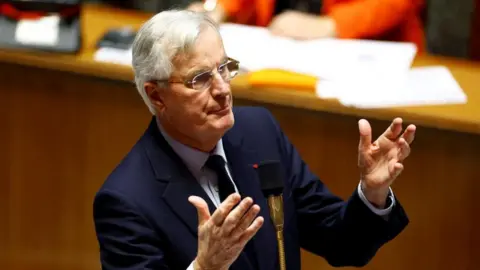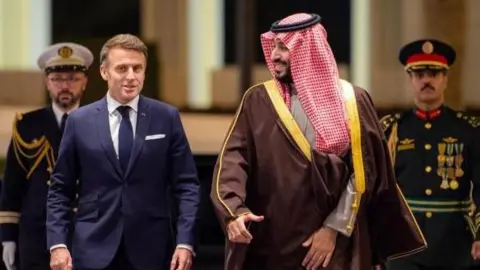Why the turmoil in France worries Europe so much

 Reuters
ReutersThe French government has overthrown, after opposition parties in the French parliament supported it vote of no confidence against Prime Minister Michel Barnier, who used special powers to force through the social budget on Monday.
That the world is confused – political and economic – is not the only major concern for French citizens.
These are times of deep instability around the world.
And France, along with Germany, is traditionally seen as the “engine” of the EU in terms of ideological and political power.
But that car is falling apart, to put it mildly.
France is not alone in being attacked and disrupted by domestic political conflicts. Germany will hold a snap general election in February after the collapse of its coalition government.
The whole EU is affected.
What about that determined show of strength and unity that Europe aims to maintain in the face of an expansionist, aggressive Kremlin?
And how will Europe fulfill its promise to remain firm on the side of Ukraine, if soon President Donald Trump reduces or stops the flow of military aid to Kyiv?
France is, after all, Europe’s greatest military power, along with the UK.
Trump’s return to the White House fills the EU and Europe at large with anxiety.
How could his deep resentment about the trade deficit with the US and Europe and Europe’s (insufficient) defense spending, explode into political reality?
At this crucial time in geopolitics, leadership in the EU is sorely lacking. The bloc is beginning to feel off its pins, as the rise of authoritarian, Russian-sympathetic leaders in Hungary, Slovakia and Romania – and French and German concentration weakens and falters.
In France, there is no real end to political instability in sight.
President Emmanuel Macron will appoint a new prime minister, but even then parliament will remain divided between three hostile political factions, which can fight over much-needed reforms and a new budget.
And here’s another reason why what’s happening in France matters beyond its borders: It’s the second largest economy in the eurozone. Its budget deficit exceeds EU norms. French government debt is similarly raising eyebrows.
This hurts French taxpayers who are worried about the cost of living, and who are free from the rest of the euro area, fearing the consequences of the damage to their currency’s reputation if Big Beast France appears to be out of control.
Big Beast Germany, on the other hand, the largest economy of the EU, is also in trouble. Its once-booming export industry (even before Trump’s threatened import tariffs from January 2025) is such that it threatens to drag its central and eastern European neighbors, long used by Germany as a factory base, into its own economic depression.
Macron in the firing line
In all this, Macron wants to present himself as an island of calm.
While the prime minister took to French television on the eve of the no-confidence vote to warn of economic instability, urging French lawmakers to put country before party politics and support him and his austerity budget, Macron took a very different tone.
“They should not scare people with these things, we have a strong economy,” he said.
“France is a rich, strong country, which has made many reforms and stuck to them, with stable institutions, a stable constitution.”
Macron was speaking from Saudi Arabia, where he completed a three-day visit before flying to Paris just before the vote.
And he, too, is in the firing line.
The closure of the French parliament is a result of the snap election he called in France this summer and in which his party, Renaissance, scored a big hit.
 Shutterstock
ShutterstockUnder French law, no new parliamentary elections can be held for at least a year, which means almost no new austerity budget until the end of summer/autumn 2025, even if new elections would produce a clear political result – something that is not revealed to the public. votes.
So, among Macron’s many rivals now, there are growing calls for him to resign. They say this will break the political deadlock in France.
A critic might suggest that they trust a new French president from their own political party.
Macron describes the idea of an early vote for the president – his full term ends in 2027 – as a “political myth”. He insists that he was voted into office by the French public to fulfill their demands.
But one politician who has good reason to push for his immediate exit from politics is a woman described as his long-time political enemy: presidential hopeful Marine Le Pen of the hardline National Rally Party.
He is being investigated for alleged misuse of EU public funds – something he denies. However, if found guilty, he could be barred from holding political office for five years. This will mean that the 2027 French presidential election must be held.
A decision on his case is expected to be announced at the end of March.
If Macron resigns now, a presidential election would have to be called in 30 days, giving Le Pen the chance to stand up and – hopefully this time – win.
Politically, socially, economically, there is a lot riding on what happens next in and outside of France.
Source link




